 MyDogBreeds
MyDogBreeds Ibizan Hound is originated from Spain but Doxiepoo is originated from United States. Ibizan Hound may grow 49 cm / 20 inches higher than Doxiepoo. Ibizan Hound may weigh 22 kg / 49 pounds more than Doxiepoo. Ibizan Hound may live 3 years less than Doxiepoo. Ibizan Hound may have more litter size than Doxiepoo. Ibizan Hound requires Low maintenance. But Doxiepoo requires Moderate maintenance
Ibizan Hound is originated from Spain but Doxiepoo is originated from United States. Ibizan Hound may grow 49 cm / 20 inches higher than Doxiepoo. Ibizan Hound may weigh 22 kg / 49 pounds more than Doxiepoo. Ibizan Hound may live 3 years less than Doxiepoo. Ibizan Hound may have more litter size than Doxiepoo. Ibizan Hound requires Low maintenance. But Doxiepoo requires Moderate maintenance
 This lean, speedy and agile hound dog looks and acts very much like a Pharaoh Hound except the Ibizan Hound is larger and a different color. The image of dogs that look like the Ibizan have been seen since 3400 BC in Egypt. The dogs were probably brought by sailors to Ibiza and surrounding islands. They came about 700-900 BC. It is believed that they actually came for the island of Elvissa and Spain, where they speak Catalan. It was also known in France as the le chanigue. There job was the same. To hunt rabbits.
This lean, speedy and agile hound dog looks and acts very much like a Pharaoh Hound except the Ibizan Hound is larger and a different color. The image of dogs that look like the Ibizan have been seen since 3400 BC in Egypt. The dogs were probably brought by sailors to Ibiza and surrounding islands. They came about 700-900 BC. It is believed that they actually came for the island of Elvissa and Spain, where they speak Catalan. It was also known in France as the le chanigue. There job was the same. To hunt rabbits.
They were fast hunting greyhound type dogs. They hunted for rabbit for the Ibizaners and themselves. These dogs hunt by day and by night. They are not just sight hounds, they also hunt by smell and hearing, in packs or by themselves. They use their sight to find and corner the prey. Then they act like retrievers and bring it back to the hunter. Their function and look is very similar to several other dogs such as the Pharaoh Hound, the Greyhound, the Portuguese Podengo, the Cimeco dellEtna and the Podence Canario. The Ibizan is larger than any of these, but all these breeds are considered to be “primitive”.
Within the breed itself there are smooth, wire and longhaired Ibizan Hounds. The Smooth is by far the most common. A great jumper, nimble runner built for stamina, the Ibizan Hound was just what the island people needed. The breed lived in isolation on the island for many centuries, under a variety of rulers including the Romans, Egyptians, Vandals, Carthaginians, Chaldeans, Arabs and Spanish. Because of the harsh island conditions, the farmers only allowed the best hunters among the Ibizan Hounds to procreate thus assuring a breed that is unchanged from ancient stock.
By 1950 the Ibizan Hound was brought to America. Because this dog is not a pet but a working machine, it took awhile for the breed to become popular enough to be recognized by the American Kennel Club (AKC) in 1979. Still the Ibizan Hound is a rare breed with the female being a better hunter than the male. One of the most common activities of this breed in the U.S. is lure coursing. These events are sponsored by AKC and ASFA as well as racing events in the NOTRA and LGRA.
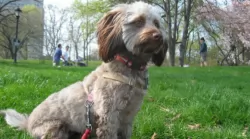 The Doxiepoo is a designer dog breed - a combination of the Dachshund who was used to hunt for Badgers and the Poodle, a dog bred in France to essentially be a lap dog. There is however some dispute as to whether the Poodle descends from Germany or from the French Barbet.
The Doxiepoo is a designer dog breed - a combination of the Dachshund who was used to hunt for Badgers and the Poodle, a dog bred in France to essentially be a lap dog. There is however some dispute as to whether the Poodle descends from Germany or from the French Barbet.
Wherever the parents hail from, the Doxiepoo hails from the United States of America.
With both the Poodle and the Dachshund being intelligent, fun and loving type of canines, the two of them together have brought out a wonderful hybrid pet in the Doxiepoo. Today, the Doxiepoo is bred with other Doxiepoos.
 The breed is agile, elegant, athletic and graceful. At the same time the Ibizan Hound is a fierce hunter travelling at unreal speeds to catch his rabbit prey. They are a hardy breed with a lean and long neck, and a lean, muscled body with laid back shoulders. The ears are specific to the breed, with a broad base leading to long, beautiful ears. They have tan eye rims, nose, foot pads, and ears. The eyes themselves are an amber with an intelligent and alert expression.
The breed is agile, elegant, athletic and graceful. At the same time the Ibizan Hound is a fierce hunter travelling at unreal speeds to catch his rabbit prey. They are a hardy breed with a lean and long neck, and a lean, muscled body with laid back shoulders. The ears are specific to the breed, with a broad base leading to long, beautiful ears. They have tan eye rims, nose, foot pads, and ears. The eyes themselves are an amber with an intelligent and alert expression.
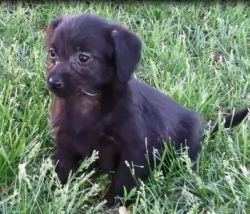 The Doxiepoo can range from being a small to medium sized dog, standing at anything between 20cm to 25cm in size and weighing between 3kg and 7kg, depending much on whether a standard, miniature or toy sized poodle was used in the breeding.
The Doxiepoo can range from being a small to medium sized dog, standing at anything between 20cm to 25cm in size and weighing between 3kg and 7kg, depending much on whether a standard, miniature or toy sized poodle was used in the breeding.
The Doxiepoo could look like either one of the two breeds, but he will have a strong, sturdy body with a curly or wavy coat of varying lengths and various colors - cream, black, tan, apricot, grey or white. The poodle side of him ensures he is a hypoallergenic dog.
Between the Dachshund and the Poodle, you’re going to get a wonderful array of characteristics as they both come with their strong points. Certainly you will be well entertained and amused by your pet, while he can also be useful as a watchdog.
Being a small dog, he will fit well into life in the city or in the countryside. He is as bright as a button and learns tricks and new skills quickly. With training and socialization he becomes obedient and well behaved wherever he is, getting on well with other pets in the home as well as with all children and adults.
The Doxiepoo is a lively, alert, energetic dog and will require being exercised – lots of ball games and a walk will keep him lean, muscular and content.
 They love children but be careful they do not knock them over and don’t let the children play to rough.
They love children but be careful they do not knock them over and don’t let the children play to rough.
Exceptional jumping ability, speed and stamina.
Must have a large fenced yard and a place to run full out.
Very intelligent with excellent learning ability.
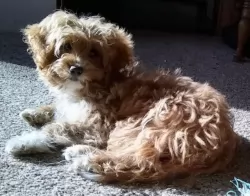 Every dog, even the little ones like this, will require some kind of input from you if you want to get the best from him. Every puppy bought as a gift when they’re cute and cuddly turns into an adult, and often the very person who received him as a gift, loses interest and neglects him. Then they wonder why the dog becomes irritating and destructive.
Every dog, even the little ones like this, will require some kind of input from you if you want to get the best from him. Every puppy bought as a gift when they’re cute and cuddly turns into an adult, and often the very person who received him as a gift, loses interest and neglects him. Then they wonder why the dog becomes irritating and destructive.
A dog is a long term investment and if you commit to your sweet Doxiepoo, you’ll get years and years of devoted friendship.
 Despite being isolated on the islands for all those years, the Ibizan Hound has several tendencies toward medical issues:
Despite being isolated on the islands for all those years, the Ibizan Hound has several tendencies toward medical issues:
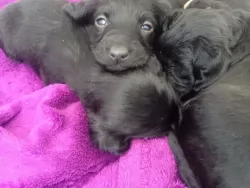 The life expectancy of the Doxiepoo is around 12-15 years of age if he is well looked after. He is a robust dog, but he can still face some health issues that both his parents contend with.
The life expectancy of the Doxiepoo is around 12-15 years of age if he is well looked after. He is a robust dog, but he can still face some health issues that both his parents contend with.
Just some of the diseases that the Doxiepoo might face while in your care are ear- and skin infections, dental disease, digestive tract problems, heart conditions and epilepsy. If you think your pet has any kind of illness, it is imperative to get him to the vet for a checkup.
Poodles, particularly are prone to skin disorders. They can be allergic to grass, parasites and food. If your Doxiepoo chews or licks his paws or some other area a lot, and the skin is red, he could have a skin allergy.
The vet will be able to diagnose your dog’s allergies with some skin- or blood testing. For instance, sebaceous adenitis is an inherited allergy that affects the lubrication of the skin and hair follicles. Symptoms of the disease include scaly skin, sore and even hair loss.
 Your Ibizan Hound is an athlete and needs to be fed like one. As a puppy he needs high quality breed or group (hound) specific food. Feed her 3-4 times a day based on calories. A puppy needs about 866 calories each day.
Your Ibizan Hound is an athlete and needs to be fed like one. As a puppy he needs high quality breed or group (hound) specific food. Feed her 3-4 times a day based on calories. A puppy needs about 866 calories each day.
If your dog participates in sports as adults, they need between 1450 and 2900 calories each day. The exact amount depends on how much activity the dog is engaged in. Feed at least 2 times a day.
Great speed and stamina
Your Ibizan Hound is a working athlete. He needs a lot of exercise and he needs a chance to run full out so access to land is essential. It can be a large back yard, or it can be a dog park. No matter what it is, it is essential for the Ibizan Hound. She will also require long walks at least a couple times a day. However, do not over exercise your puppy. They are great jumpers as well as runners.
The sport of lure coursing was made for the Ibizan in the same way that it was made for the Greyhound. They are good at Flyball and agility as well.
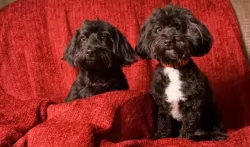 You can’t be sure what kind of coat your Doxiepoo will have but he will certainly require brushing at least twice a week. In some instances it may be wise to seek out the services of a professional groomer who does an excellent job of trimming the hair, cleaning the teeth, checking the ears and clipping the nails.
You can’t be sure what kind of coat your Doxiepoo will have but he will certainly require brushing at least twice a week. In some instances it may be wise to seek out the services of a professional groomer who does an excellent job of trimming the hair, cleaning the teeth, checking the ears and clipping the nails.
The Doxiepoo, just like any other dog, will need to be trained and socialized early as he is a stubborn dog and will need to be trained to be obedient. With this training and socialization, he becomes amicable around children and pets in the home. He learns easily too and this is what makes him a great pet for first time dog owners.
The Doxiepoo is a moderate energy dog, so he will do well on a walk every day. You can also make use of ropes, balls and frisbees to give him a bit of a workout in the garden.
He loves water too and will enjoy a run on the beach and cooling off in the ocean. He adapts easily to life in the city or in the country, so long as he is with his human companions.
The Doxiepoo will eat dry kibble, particularly if it is from the highest quality brands and chosen according to the dog’s size, age and activity levels.
Now and then you can add in a little bit of cooked rice, vegetables and chicken for variety. Some raw meat can play an important role in keeping the skin healthy and free from dryness and itchiness. Make sure that he always has fresh, cool water available to him.